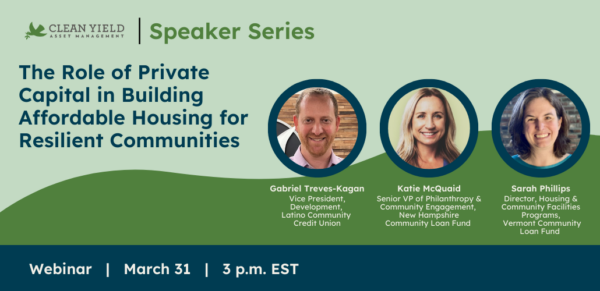Getting started on diversity, equity, and inclusion

Last year, Clean Yield published a print report for clients for the first time in nearly 10 years. It was intended to be a remedy for the barrage of electronic communication that we all receive. We were proud of the finished product, but the process of creating the report surfaced a hard truth that we simply could not gloss over. The Vermont aesthetic that imbues our materials and website lacks racial diversity. A diversity of natural landscapes and farm animals? Yes. Diversity of people? No. Further, it portrays white privilege, which is at odds with the just, inclusive economy we seek. We felt uncomfortable that our materials could be reinforcing the norms of white privilege and racism that we want to move past. We decided it was time to begin building our cultural competency in earnest. We are sharing the story of how Clean Yield has started working to understand and address racial equity and justice in the hope that it will help others begin this important work.
Once the report was published, we decided we needed to work on diversity, equity, and inclusion (DEI), but we were unsure of how. Figuring out where to start felt overwhelming. Did we need a coach or training or both? Did we need a national consulting firm or a local one? Did we need a year-long training program or just help developing a plan? We decided to start with the most accessible option: the 21-Day Racial Equity Challenge hosted by Food Solutions New England.
The 21-day Racial Equity Challenge is a program through which participants receive daily thought-provoking content that highlights different aspects of DEI and where it intersects with the food system. Content is provided in different forms – videos, articles, excerpts from books, podcasts, etc. – and includes curated questions for reflection and/or discussion. The program runs for 21 days because it is said that it takes 21 days to create a habit. Our team of seven met weekly to discuss the material and our reactions. We deepened our understanding of our own biases and considered the role our business plays in reinforcing the wealth gap. At the end, we were energized and ready to take on more.
We found a Vermont-based consulting firm, CQ Strategies, to steer us through the next phase. CQ offers community-based cultural competency training called We All Belong throughout Vermont. CQ believes that this work is best done in communities, because having shared experiences and different perspectives enriches the learning. CQ didn’t offer training in the Upper Valley but agreed to come our way if we could find three groups in our community to join us. We reached out to a few local businesses, fellow B Corps, and another like-minded group and asked if they would join us. Shortly thereafter, we had the CEOs and senior leadership teams from some of the Upper Valley’s most influential businesses in a room for three full days over three months. These leaders were ready to do the hard work of identifying biases, both personally and within their organizations, and figuring out how to work past them to create relationships and organizations where everyone can contribute their fullest. To see these influential people so deeply engaged in this work gave us hope.
Coming out of the training, Clean Yield committed to expanding the work within our spheres of influence. Over the next year, we plan to build out our impact investments and shareholder advocacy around racial equity and inclusion. We also want to find ways to invite clients to engage more with issues of racial equity. We know that there is so much more work to be done and don’t claim to have this figured out yet, but we are committed to continuing to do the hard work and doing what we can to make our communities and our economy more just and inclusive.
More News & Insights
Upcoming Speaker Series: The Role of Private Capital in Building Affordable Housing for Resilient Communities
We invite you to join us on March 31 at 3 p.m. ET to participate in this critical conversation on affordable housing.
Proxy Voting: A Critical Tool for Individuals and Investors to Influence Corporate Behavior
Learn how proxy voting gives equity (stock) investors a powerful tool to pressure corporations to act more responsibly.
A New Kind of Meat
Through Clean Yield’s U.S. Sustainable Investment Forum membership, Liz Levy attended a meeting to gain insights on the emerging cultivated meat industry.


